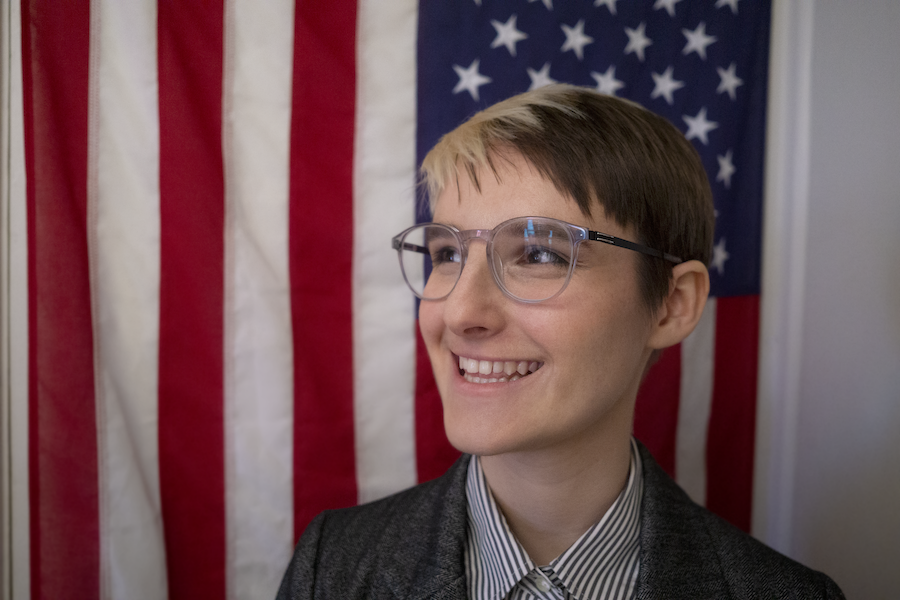Serving as a Congressional Innovation Fellow
This post was originally shared on the TechCongress blog under the title Meet the Fellows 2021: B Cavello. To apply to TechCongress, visit techcongress.io/apply. You can also read B’s answers to the 2021 application as a reference.

In many ways, working for the government on tech policy issues seems like a far-off fantasy that I never would have imagined becoming real. In other ways, it feels almost like fate.
My career up until joining TechCongress has taken many turns. I’ve worked in literal garage startups and massive multinational corporations, in academic environments and in nonprofits. I’ve had the privilege of working alongside countless brilliant people advancing work on important, world-changing issues. I’m grateful to have been afforded the opportunity to peer behind the curtain at the inner workings of so many of the different systems that power our world. And yet, there’s been a massive gap in my experience: one of the most powerful institutions of them all, the United States government.
If I’m honest, I’d all but written off government work. Sure, I’ve known friends with ambitions of making their way into an executive branch appointment or public defenders toiling for justice, but I never imagined a place like Congress had a place for me. As a nonbinary person, a person without advanced degrees, a person who worked at a company with “Exploding” in the name (let alone “Exploding Kittens!”), I had somewhat unconsciously come to think of Congress as outside the bounds of possibility for me.
At the same time, it also feels logical that I would be here, doing this work.
After all, Phenomenon Media 501c3, the tech education nonprofit I co-founded right after finishing university was in many ways inspired by Congress. The infamous “series of tubes” comments from 2006 had served as a wake-up call that this nation needed greater literacy around tech issues and had fueled my dive into learning about internet infrastructure and information security. Working on developing toys and tools to teach people about technology in new ways gave me opportunities to relate sometimes abstract tech topics to people’s real lives and experiences and to foster communities in the process.
Over a decade after the “series of tubes,” the notorious “Senator, we run ads” testimony from 2018 further fueled my drive to play a positive role in technology governance. Working in IBM Watson implementations gave me insight into the many challenges that companies and governments alike face in adapting to technological change well as the potential opportunities and harms of AI. As a program lead at the Partnership on AI I got to apply these insights, leading multi-stakeholder research with leaders at Google, Microsoft, Facebook, the ACLU, UNI Global Union, and others. These collaborations developed my experience translating between contexts and facilitating important conversations across philosophical and professional divides. So many of these conversations pointed back to Congress. Even with so many good-hearted people who want technology to be better and to do better, I frequently encountered frustrations that our government was not acting quickly enough or strategically enough when it came to tech policy issues. It almost became a joke that the end of every conversation would conclude that “really, it’s up to policymakers” to take action and define the landscape for responsible technology development.
All of these experiences reaffirmed to me that it is essential to the well-being of our country (and our planet!) that our government has both the expertise and the capacity for tech-informed leadership. That’s why I was so excited to learn about and ultimately have the opportunity to take part in the Congressional Innovation Fellowship. Because, thanks to TechCongress, there is a place in Congress for people with experiences like mine. I’m eager to better understand the realities that congresspeople face and affect change on issues that are important to me: health & disability justice, security & privacy, shared prosperity, and our environment.
Given my circuitous career path, I don’t know what the future will hold. However, I do know that firsthand experience working in government will help me drive positive change and inform my decision on where my abilities can do the most good. I am not going to sit by the sidelines and wish that our government was better equipped to address the fast-moving issues that technology sparks. With TechCongress, I am going to be part of the solution.
